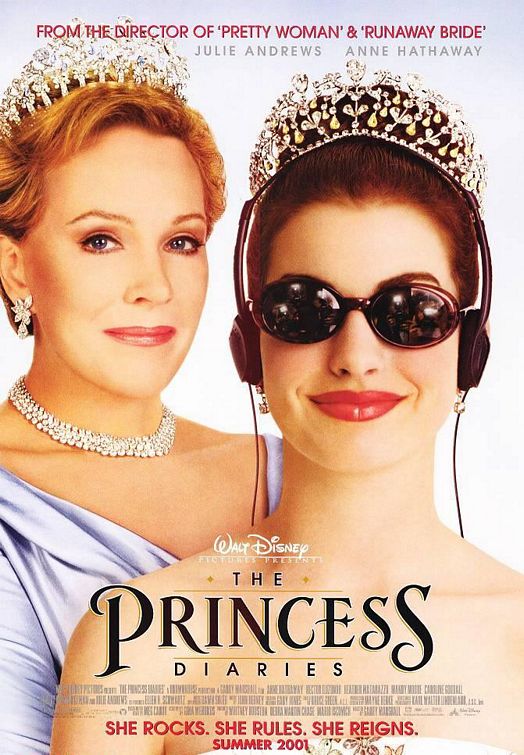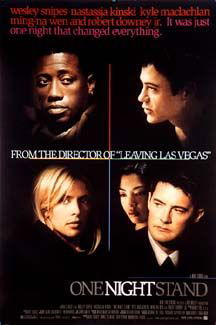"Exploring Adultery"

| None | Light | Moderate | Heavy | |
|---|---|---|---|---|
| Language | ||||
| Violence | ||||
| Sex | ||||
| Nudity |
What You Need To Know:
In ONE NIGHT STAND, Figgis is not able to successfully negotiate a three-act story structure, Snipes talks to the camera for no effect, and Charlie's death seems contrived. ONE NIGHT STAND has moody music, also created by Figgis. The moral of this story is that adultery is justifiable, no matter what pain it may cause. In fact, there is no justification for adultery, and we all have an obligation to remain faithful to our spouses.
Content:
(HHH, LL, SSS, NNN, A, D, Ho, M) Humanist worldview exploring adultery; 17 obscenities & 5 profanities; one brutal but bloodless mugging scene; two drawn out scenes of adulterous intercourse, two drawn out scenes of noisy martial intercourse, adulterous kisses, sexual innuendo, lewd gestures, & homosexual character; full male & female nudity but no genitalia; alcohol use; smoking & marijuana use; and, miscellaneous immorality including arguing & pagan attitudes
More Detail:
Filmmaker Mike Figgis explored alcoholism in the nihilistic and dramatically static LEAVING LAS VEGAS. That movie reveled in complete abandonment to sin. In ONE NIGHT STAND, Figgis creates a dramatically dynamic movie, replacing alcoholism with adultery. The movie tells the story of a troubled man who commits adultery, deals with the effects on his family and resolves his problem immorally.
Max Carlyle (Wesley Snipes) is a successful TV commercial director in Los Angeles. He has a beautiful home, a beautiful wife, Mimi (Ming-Na Wen), and two beautiful children. On a business trip to New York, Max goes to meet his former best friend, Charlie (Robert Downey, Jr.). Charlie and Max had a falling out five years ago, and now Max discovers that Charlie is dying of AIDS-related diseases. The meeting is amicable. Max tells Charlie he will be available to him any time he needs him. Max checks out of his hotel and tries to leave to JFK for a flight home, but congested traffic causes him to miss the flight. He goes back to the hotel and meets a beautiful woman named Karen (Nastassja Kinski). They talk, go to the symphony and end up in Karen’s bed for an evening of fornicating.
In Los Angeles, Max is greeted by his wife, who smells a different perfume on him. Back home, Max and Mimi engage in some unusual sexual activity, but their relationship slowly deteriorates, and they argue. A year later, Max and Mimi return to New York to be with Charlie in his last days. To his surprise, Max learns that Karen is the wife of Charlie’s brother, Vernon (Kyle MacLachlan). Vernon asks Max and Mimi to join him and his wife for dinner. Afraid of being found out, Max and Karen are withdrawn, while Mimi and Vernon carry on spirited conversation. On the night of Charlie’s death, Max and Karen again commit adultery, and Mimi and Vernon commit adultery. The couples discover each other, leading to an immoral, though consensual conclusion for all involved.
Regrettably, Figgis is not able to successfully negotiate a three-act story structure. Also, he errs in opening the movie with Snipes talking directly into the camera to the audience. Snipes doesn’t talk to the audience at any other time in the movie, so there seems to be no point in doing it at the start. Charlie’s AIDS-related death seems contrived and creates no sympathy from the audience. The audience doesn’t not know enough about Charlie’s character to have an emotional attachment to him.
As is his style, Figgis has created moody music for ONE NIGHT STAND, which implies a serious intent, which is not equaled by the story or its characters. Though Karen is beautiful, she doesn’t say much, and it is difficult to understand why Max would be so attracted to her since his wife seems more than willing to satisfy his desires.
However, the heart of the matter is that there is no excuse or justification for adultery. We all have an obligation to remain faithful to our spouses. The moral of this story is that adultery is excusable, and there can be immoral solutions that justify it, no matter how much pain it may cause. Thus, this is an irresponsible picture.
ONE NIGHT STAND seems to be a movie that will not be embraced by the public at large. Much better movies have been made about adultery. ONE NIGHT STAND may be the length of time it stays in theaters.



 - Content:
- Content: 



